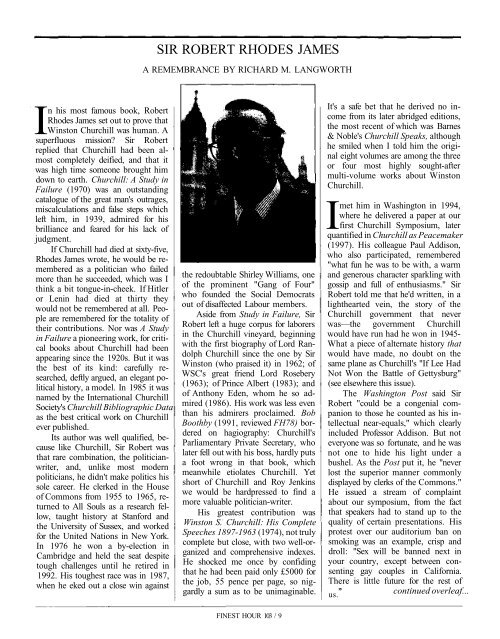.JOURNAL OFTIIE CHURCHILL CKNTER AND ... - Winston Churchill
.JOURNAL OFTIIE CHURCHILL CKNTER AND ... - Winston Churchill
.JOURNAL OFTIIE CHURCHILL CKNTER AND ... - Winston Churchill
- No tags were found...
Create successful ePaper yourself
Turn your PDF publications into a flip-book with our unique Google optimized e-Paper software.
SIR ROBERT RHODES JAMESA REMEMBRANCE BY RICHARD M. LANGWORTHIn his most famous book, RobertRhodes James set out to prove that<strong>Winston</strong> <strong>Churchill</strong> was human. Asuperfluous mission? Sir Robertreplied that <strong>Churchill</strong> had been almostcompletely deified, and that itwas high time someone brought himdown to earth. <strong>Churchill</strong>: A Study inFailure (1970) was an outstandingcatalogue of the great man's outrages,miscalculations and false steps whichleft him, in 1939, admired for hisbrilliance and feared for his lack ofjudgment.If <strong>Churchill</strong> had died at sixty-five,Rhodes James wrote, he would be rememberedas a politician who failedmore than he succeeded, which was Ithink a bit tongue-in-cheek. If Hitleror Lenin had died at thirty theywould not be remembered at all. Peopleare remembered for the totality oftheir contributions. Nor was A Studyin Failure a pioneering work, for criticalbooks about <strong>Churchill</strong> had beenappearing since the 1920s. But it wasthe best of its kind: carefully researched,deftly argued, an elegant politicalhistory, a model. In 1985 it wasnamed by the International <strong>Churchill</strong>Society's <strong>Churchill</strong> Bibliographic Dataas the best critical work on <strong>Churchill</strong>ever published.Its author was well qualified, becauselike <strong>Churchill</strong>, Sir Robert wasthat rare combination, the politicianwriter,and, unlike most modernpoliticians, he didn't make politics hissole career. He clerked in the Houseof Commons from 1955 to 1965, returnedto All Souls as a research fellow,taught history at Stanford andthe University of Sussex, and workedfor the United Nations in New York.In 1976 he won a by-election inCambridge and held the seat despitetough challenges until he retired in1992. His toughest race was in 1987,when he eked out a close win againstthe redoubtable Shirley Williams, oneof the prominent "Gang of Four"who founded the Social Democratsout of disaffected Labour members.Aside from Study in Failure, SirRobert left a huge corpus for laborersin the <strong>Churchill</strong> vineyard, beginningwith the first biography of Lord Randolph<strong>Churchill</strong> since the one by Sir<strong>Winston</strong> (who praised it) in 1962; ofWSC's great friend Lord Rosebery(1963); of Prince Albert (1983); andof Anthony Eden, whom he so admired(1986). His work was less eventhan his admirers proclaimed. BobBoothby (1991, reviewed FH78) borderedon hagiography: <strong>Churchill</strong>'sParliamentary Private Secretary, wholater fell out with his boss, hardly putsa foot wrong in that book, whichmeanwhile etiolates <strong>Churchill</strong>. Yetshort of <strong>Churchill</strong> and Roy Jenkinswe would be hardpressed to find amore valuable politician-writer.His greatest contribution was<strong>Winston</strong> S. <strong>Churchill</strong>: His CompleteSpeeches 1897-1963 (1974), not trulycomplete but close, with two well-organizedand comprehensive indexes.He shocked me once by confidingthat he had been paid only £5000 forthe job, 55 pence per page, so niggardlya sum as to be unimaginable.It's a safe bet that he derived no incomefrom its later abridged editions,the most recent of which was Barnes& Noble's <strong>Churchill</strong> Speaks, althoughhe smiled when I told him the originaleight volumes are among the threeor four most highly sought-aftermulti-volume works about <strong>Winston</strong><strong>Churchill</strong>.Imet him in Washington in 1994,where he delivered a paper at ourfirst <strong>Churchill</strong> Symposium, laterquantified in <strong>Churchill</strong> as Peacemaker(1997). His colleague Paul Addison,who also participated, remembered"what fun he was to be with, a warmand generous character sparkling withgossip and full of enthusiasms." SirRobert told me that he'd written, in alighthearted vein, the story of the<strong>Churchill</strong> government that neverwas—the government <strong>Churchill</strong>would have run had he won in 1945-What a piece of alternate history thatwould have made, no doubt on thesame plane as <strong>Churchill</strong>'s "If Lee HadNot Won the Battle of Gettysburg"(see elsewhere this issue).The Washington Post said SirRobert "could be a congenial companionto those he counted as his intellectualnear-equals," which clearlyincluded Professor Addison. But noteveryone was so fortunate, and he wasnot one to hide his light under abushel. As the Post put it, he "neverlost the superior manner commonlydisplayed by clerks of the Commons."He issued a stream of complaintabout our symposium, from the factthat speakers had to stand up to thequality of certain presentations. Hisprotest over our auditorium ban onsmoking was an example, crisp anddroll: "Sex will be banned next inyour country, except between consentinggay couples in California.There is little future for the rest ofus.continued overleaf...FINEST HOUR 103 / 9

















